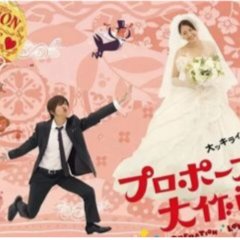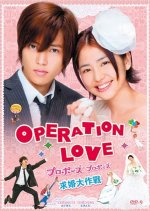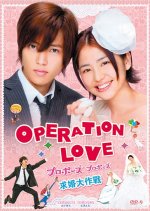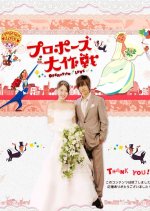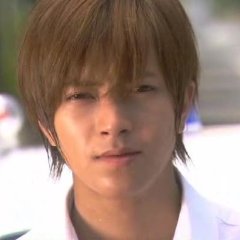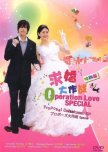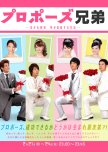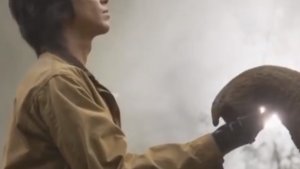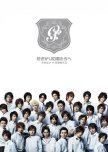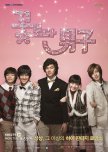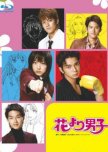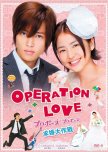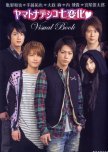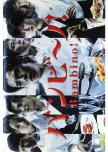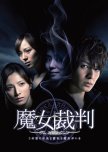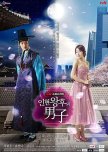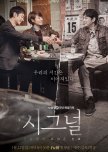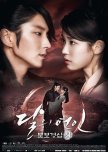 Discover the Music ~ Dramaland Edition
Discover the Music ~ Dramaland Edition Un jeune homme du nom de Iwase Ken, obstiné et pitoyable en amour tombe amoureux de Yoshida Rei, son amie d'enfance, mais elle n'en sais rien et se marie avec un autre homme. Lors de la cérémonie de mariage, une fée apparait et permet à Ken de retourner dans le passé, lui donnant une seconde chance de conquérir le cœur de Rei. (Source: Nautiljon) Modifier la traduction
- Français
- 中文(简体)
- Español
- Türkçe
- Titre original: プロポーズ大作戦
- Aussi connu sous le nom de: Operation Love , Proposal Mission , puropoozu daisakusen
- Scénariste: Kaneko Shigeki
- Réalisateur: Katou Yuusuke, Hatsuyama Yasuhiro, Narita Gaku
- Genres: Comédie, Romance, Jeunesse, Surnaturel
Distribution et équipes
- Yamashita Tomohisa Rôle principal
- Nagasawa Masami Rôle principal
- Hamada GakuTsurumi HisashiRôle Secondaire
- Eikura NanaOku EriRôle Secondaire
- Hiraoka YutaEnokido MikioRôle Secondaire
- Fujiki NaohitoTada TetsuyaRôle Secondaire
Critiques

I have been led to think by past experiences that the more I watch Asian dramas, the more fastidious I become; it is therefore quite ironic that in this case my better knowledge came out as an incentive to appreciate the drama more, not less.
When I approached Proposal Daisakusen the first time, all my attention was captured by the love story between Kenzo and Rei. I was so anxious for him to do the right thing and say the right words that I overlooked all the rest. But guess what: as odd as it may sound, this drama is all about 'the rest'. Daisakusen in Japanese means 'big strategy', as in organizing a war campaign. View in this light, we could think of Kenzo's time travelling as it were a war where single episodes are the several battles fought. To maintain the analogy, if while watching you put all your energy in trying to win every single battle, you'll end up frustrated, but if you keep the target in mind, i.e. win the war, you may truly appreciate this 'big strategy'. Despite all premises to the contrary, this drama is not so much about Kenzo managing to change Rei's heart as it is a journey of a young man understanding what's truly important in life and establishing clear priorities. It also makes you reflect upon the true meaning of love, whether it were only about declaring it aloud or rather be there when the person you love needs you.
In this sense, I believe this drama to be a lot cleverer than your average romantic comedy. It touches issues like friendship, family, loyalty, generosity and honesty. It takes its time, lingering on what seem little details, but it turns out that changing a small detail can make a huge difference not only in your life, but on the direction the people around you will take as well. The thin thread underlying the whole show is an old friend: carpe diem. Seize the moment and the opportunity, you may not have a second chance. This is a very simple philosophy, but it is so dear to me I firmly believe it cannot be repeated or stressed enough. Don't procrastinate, don't give the people around you for granted, thinking you have all the time in the world to do the right thing, to convey your feeling or to listen to them when they need an ear.
I consider the special as integral part of the drama, so I indirectly include that one in this review. They called it special, but it could just as well be episode 12, so I suggest you watch the special too before rating the show.
The acting is fine. It could have been more intense, but I'm willing to forgive the occasional stone-face because the characters created by the whole cast are truly endearing and hard to forget. They are very natural as a group of friends and as such I ended up imagining them.
The music isn't the strong trait of the drama. It has a lovely instrumental piece and a very old-fashioned song repeated now and again. In the end, I have become quite deaf to both. A little variety wouldn’t have hurt...
I suppose there's no need for me to explain why the re-watch value is so high. If you are ready to put aside Kenzo's eternal hesitation and Rei's insecurity - which by the way are paramount traits of their personality, without which the drama wouldn't have been created - and you fix gaze and mind on the whole picture, you may end up loving it as much as I did on second watching. There's a constellation of little events, many related to the Japanese culture and rituals, that is delicious and heart-warming.
After 7 years, I'm now ready to recommend this drama to everyone.
Cet avis était-il utile?
Cette critique peut contenir des spoilers
[Warning: long review]This isn't just a show. It's a story close to life; a story of great moral value and lessons to be learnt. This is an amazing journey through the eyes of a man who can be similar to many of us at some point in our lives. And I believe many people, including myself, have come out of this journey a better person. The below is more an in-depth review more for people who've already watched the show, but if you are curious to what exactly is so good about the show, feel free to read on, since there are no big spoilers in this review.
The story is simple enough; Ken is a shy guy who never managed to express his love to his childhood friend, Rei, and now he is attending her wedding to another man. A fairy pops up to grant Ken the ability to correct some regrets of his past so that hopefully he will face an improved situation in the present. The idea of time-travel seems to contradict the idea of the show being close to life; if you think about it, however, everyone faces some regrets of action or non-action in the past; time-travelling back to change these is an ability we always wanted, and we simply see Ken doing what we wished we could do. These timeslips create a blueprint in the show which becomes obvious very quickly; in fact it is so faithfully replicated that the show is always in danger of becoming repetitive. However, each episode is executed masterfully such that the repetition doesn't become tiring; it instead gives the viewer a standard framework from which to view the characters, their story and the outcome of Ken's actions, making them seem all the more clearer and connected to the present. More importantly, you get to see Ken's gradual emotional development through the series. It is argued by many watchers that this format isn't the best way to present the show due to the repetitiveness; but for me it possesses a mesmerizing charm and cuteness that endears me to the show.
The characters are excellent, and I totally mean it when I say that. Many shows out there create characters to suit the story, which results in disjointed personalities and actions that seem out-of-character in some scenarios; ProDai is one of the rare few that have wholesome, complex characters whom you get to understand and relate to as the story progresses. It is as though the story is written to suit the characters, which is how real life works; this makes the show so much closer to life. Sometimes, it even angers the audience when they see how stubborn a person's personality in the show can be, because at times the show simply stagnates when Ken cannot bring himself to change the past; to me however, this is also one of the charms of the show, the rigidity of personalities is just so like life. Nevertheless, the genius scriptwriters have churned out enough twists and turns in the story to keep it interesting throughout, and effortlessly blended in moral lessons which never seem to be forced into the story (something J-doramas are bad at). Most importantly, the show was brought to a complete end, albeit an open-ended one, which was satisfying for most, but completely amazing for me.
Acting is top class as well; vintage performances are seen from Nagasawa Masami, Hamada Gaku and Mikami Hiroshi, as well as of course the star of the show, Yamashita Tomohisa. His acting isn't particularly fantastic, but he gave his character a personality unique to himself; he became Ken, Ken became him. In all, his was an absolutely memorable performance. The OST is another highlight of the show, with BGM that is always at the right places, at the right time, and invoke heavy doses of emotion and goose-bumps that really bring the show up to another level. Who could forget the inspiring themes of Rising Road and Hallelujah Flash, and their rearranged emotional renditions that play in heart-tugging scenes? The ending theme, Ashita Hareru Kana, and the insert Chiisana Koi no Uta are, well, I don't think I have to say more. Personally I have Ame Agari (translated as 'after the rain')as my favourite as well, because of the scenes that it plays in, and the meaning of the song towards the show: after the rain, sadness will vanish and everything will start anew.
With all that being said, the show has its flaws as well. Particular aspects that stuck out include the lack of development in one of the main characters, Mikio, and the convenient shafting of Tada, portrayed as the guy everyone hates but really, is just a good man fighting for his own love. Even so, I give the show a 10. I have to admit that I'm biased in the score and in this review; but it is really because I love the show so much. My advice is really to follow the show in its entirety, indulge in the characters and feel the fun, the anguish, the anxiety, and the exhilaration in the show. And most importantly, learn from it, and I promise any watcher that it will be a enjoyable and memorable journey for you as well.
Cet avis était-il utile?









